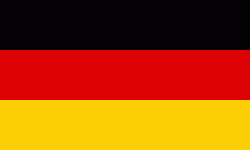Landsberg (Landkreis Landsberg am Lech)
Landsberg am Lech is a Landkreis (district) in Bavaria, Germany. It is bounded by (from the north and clockwise) the districts of Aichach-Friedberg, Fürstenfeldbruck, Starnberg, Weilheim-Schongau, Ostallgäu and Augsburg.
In 1180 the lands east of the Lech river fell to the Wittelsbach dynasty of Bavaria; the lands on the western bank were acquired about 1315.
The district of Landsberg was established in 1938 as the successor of another entity (Bezirksamt) of the same name. In the administrative reform of 1972 the district received its present shape.
In the final stages of World War II, the German Armaments Ministry and the SS established the Kaufering concentration camp, including 11 subcamps in the general area of Landsberg and Kaufering. It was set up as a subcamp of Dachau. At the end of April in 1945, the SS evacuated or destroyed what they could before the Allies arrived. A dramatization of the discovery and liberation of the camp was presented in Episode 9: Why We Fight of the Band of Brothers mini-series in the year 2001. The historical information, film and foto material were given by Anton Posset to the film producer Steven Spielberg and Tom Hanks.
In 1180 the lands east of the Lech river fell to the Wittelsbach dynasty of Bavaria; the lands on the western bank were acquired about 1315.
The district of Landsberg was established in 1938 as the successor of another entity (Bezirksamt) of the same name. In the administrative reform of 1972 the district received its present shape.
In the final stages of World War II, the German Armaments Ministry and the SS established the Kaufering concentration camp, including 11 subcamps in the general area of Landsberg and Kaufering. It was set up as a subcamp of Dachau. At the end of April in 1945, the SS evacuated or destroyed what they could before the Allies arrived. A dramatization of the discovery and liberation of the camp was presented in Episode 9: Why We Fight of the Band of Brothers mini-series in the year 2001. The historical information, film and foto material were given by Anton Posset to the film producer Steven Spielberg and Tom Hanks.
Map - Landsberg (Landkreis Landsberg am Lech)
Map
Country - Germany
 |
 |
| Flag of Germany | |
Various Germanic tribes have inhabited the northern parts of modern Germany since classical antiquity. A region named Germania was documented before AD 100. In 962, the Kingdom of Germany formed the bulk of the Holy Roman Empire. During the 16th century, northern German regions became the centre of the Protestant Reformation. Following the Napoleonic Wars and the dissolution of the Holy Roman Empire in 1806, the German Confederation was formed in 1815.
Currency / Language
| ISO | Currency | Symbol | Significant figures |
|---|---|---|---|
| EUR | Euro | € | 2 |
| ISO | Language |
|---|---|
| DE | German language |
























